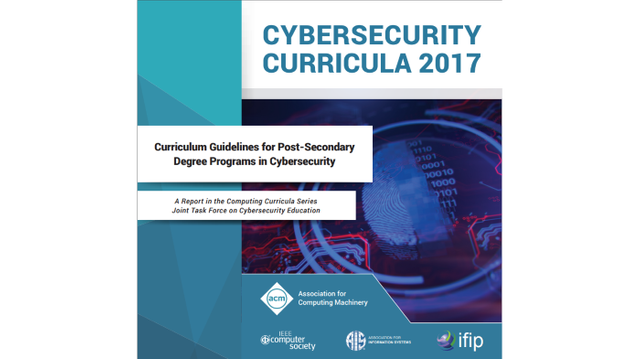Cybersecurity Guidelines for University Programs to Align the Industry
The cybersecurity industry has long needed a solid foundation for academia to build consistent and effective degree programs. There has been far too much inconsistency in cybersecurity and cyber-science education. In order to prepare the next generations of cybersecurity professionals, academic standards and curriculum must be defines and implemented.
This was the goal for the Joint Task Force on Cybersecurity Education (CSEC2017), established in 2015, to develop a guidance for curriculum content, applicable across global academic institution’s degree programs.
Cybersecurity Curricula Report
The Cybersecurity Curricula guidelines for post-secondary degree programs are published and available for anyone to review!
https://cybered.hosting.acm.org/wp-content/uploads/2018/02/newcover_csec2017.pdf
The guidelines are a leading resource of comprehensive cybersecurity curricular content for faculty members of global academic institutions seeking to develop a broad range of cybersecurity offerings at the post-secondary level. It aligns with the NICE Cybersecurity Workforce Framework and the National Centers of Academic Excellence in Cybersecurity requirements.
The Goals of the Cybersecurity Curricula Program:
- To describe a vision of proficiency in cybersecurity,
- To define a structure for the cybersecurity discipline by developing a thought-model that defines the boundaries of the discipline and outlines key dimensions of the curricular structure,
- To support the alignment of academic programs with industry needs in cybersecurity,
- To involve a broad global audience of stakeholders through continuous community engagement during the development process,
- To develop curricular guidance that is comprehensive enough to support a wide range of program types, and
- To develop curricular guidance that is grounded in fundamental principles that provide stability yet is structured to provide flexibility to support evolving program needs.
A team of over 300 professionals collaborated to create the curriculum guidelines. I had the honor of being on the Industrial Advisory Board and contributing to the content. A job well done by everyone involved in the effort to build a framework for universities to establish consistent and comprehensive cybersecurity degree programs!
Alignment across global academic institutions for cybersecurity degrees represents a powerful capability for sustainable on-boarding and building skilled talent pools to protect technology, data, and people.
I encourage everyone to take a look at the recommended scope and framework for university-level cybersecurity programs.
- Matthew Rosenquist is a Cybersecurity Strategist and advisor, benefiting from 30 years across the industry. Follow his insights, rants, industry reviews, and perspectives on your favorite social sites: LinkedIn, Twitter (@Matt_Rosenquist), YouTube, Information Security Strategy blog, and Medium.

Great info!!! Keep it coming.
So now there will be specific "cybersecurity" degrees that can be earned?
Yes, universities can use this framework to create a formal cybersecurity or cyberscience degree program!